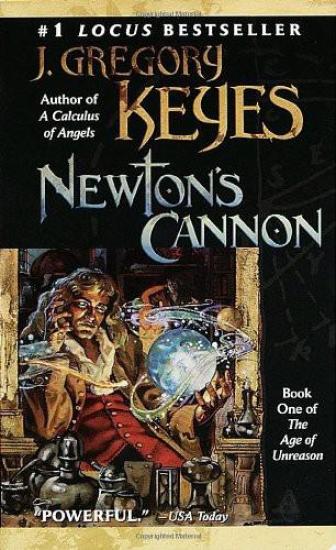
Series: Book 1 in the Age Of Unreason series
Rating: Not rated
Tags: EN-Fantasy, Lang:en
Summary
Newton's Cannon is an alternate history set
primarily in the court of Louis XIV. This might sound
familiar to readers of Vonda McIntyre's Nebula-winning Keyes's characters are expertly drawn: Louis XIV, the
aging King of France who seeks a return to international
preeminence, young Ben Franklin of Boston, a printer's
apprentice who yearns to master alchemy, and Adrienne de
Montchevreuil, a lovely, impoverished noblewoman who secretly
pursues mathematics, but attracts Louis's lustful attention.
The many secondary characters are also believable
personalities, and the plot is original and suspenseful.
Keyes's writing is precise and witty. "It was, Adrienne
reflected, impossible not to be impressed by the Grand Canal.
More like a cruciform inland sea with banks of polished
marble, it summed up many things about Versailles. It was
monumental in proportion, insanely expensive, impossible to
overlook, and entirely frivolous." Though the ending of
Newton's Cannon leaves much unresolved--setting up
book two of The Age of Unreason,
A Calculus of Angels--it's fine entertainment all by
itself.
--Nona Vero
Enlightened science is transformed into blackest magic in
the opening volume of Keyes's (The Waterborn) 18th-century
alternative history, The Age of Unreason. Sir Isaac Newton
turns alchemist to obtain Philosopher's Mercury, the key to
cosmic end-of-the-world weaponry. Stolen by a
philosopher-mage of France's King Louis XIV to use against
the invading English, the hellish device threatens to
obliterate London unless two unlikely young geniuses can
defuse it. Alternating chapters trace the pair's discrete
stories, as American icon Ben Franklin, here portrayed as a
randy adolescent, and the toothsome Adrienne de
Montchevreuil, Louis's latest mistress, separately wield
fearsome theorems against supernatural forces manipulating
humanity. Clearly enamored with the glories of Versailles,
Keyes writes passages of swordplay and foreplay that fitfully
flare into life, but the novel is ultimately foiled by muddy
secondary characterizations and a finale that fizzles.
Amazon.com Review
From Publishers Weekly
Copyright 1998 Reed Business Information, Inc.